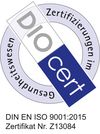Pediatric stem cell transplantation
Welcome to the Clinic of Pediatric Stem Cell Transplantation.
Bone marrow or hematopoietic stem cell transplantation has been performed in children and adolescents for 40 years. This treatment primarily helps many children with high-risk leukemia. In addition bone marrow can be replaced in response to various forms of bone marrow failure. Stem cell transplantations increasingly inspire innovative cellular and immunotherapeutic approaches to combating malignant cells. Stem cell transplantation is no longer limited to the treatment of diseases of the hematopoietic system in children and is also used to fight other congenital metabolic diseases.
Thanks to reduced intensity of chemotherapy and better concurrent medication, the risk of the procedure has been decreasing for years. Treatable diseases of childhood and adolescence include:
- acute lymphoblastic leukemia
- acute myeloid leukemia
- chronic myeloid leukemia
- severe aplastic anemia
- myelodysplastic syndrome
- severe combined immunodeficiency
- sickle cell anemia
- thalassemia
- mucopolysaccharidoses
- adrenoleukodystrophy
- metachromatic leukodystrophy and others
Cooperation with the metabolic specialists of the pediatric clinic and the neuropediatricians is a primary focus of our transplantation program led by Prof. Dr. Ingo Müller. Another focus concerns the transfer of stem cells from one parent to the child. In the aforementioned diseases the transplanted stem cells usually come from a healthy sibling or unrelated donor. It is possible, however, that no donor is found who matches the recipient’s tissue requirements. In these cases, we perform a haploidentical stem cell transplantation for which the father or mother of the child serves as the donor.
In addition, there are tumors, including neuroblastoma, treated with such high doses of chemotherapy that hematopoiesis must be restored using the patient’s own previously frozen blood stem cells. Complementary immunotherapies for these diseases are being researched.
Finally, there are severe autoimmune diseases that do not respond to conventional therapy. In these cases, a combination of immunotherapy and chemotherapy can be successful, wiping out the overreacting immune system and resetting it to its state prior to onset of the autoimmune disease using the patient’s own stem cells. These autoimmune diseases may include systemic scleroderma, Still’s disease, and multiple sclerosis.
Our Clinic of Pediatric Stem Cell Transplantation is one of the largest facilities in Europe. Yeach year, we performed transplantations on more than 40 children. A stem cell transplantation is a highly individualized treatment about which we will gladly inform you during a personal consultation.
Please direct your treatment request to the UKE International Office.




